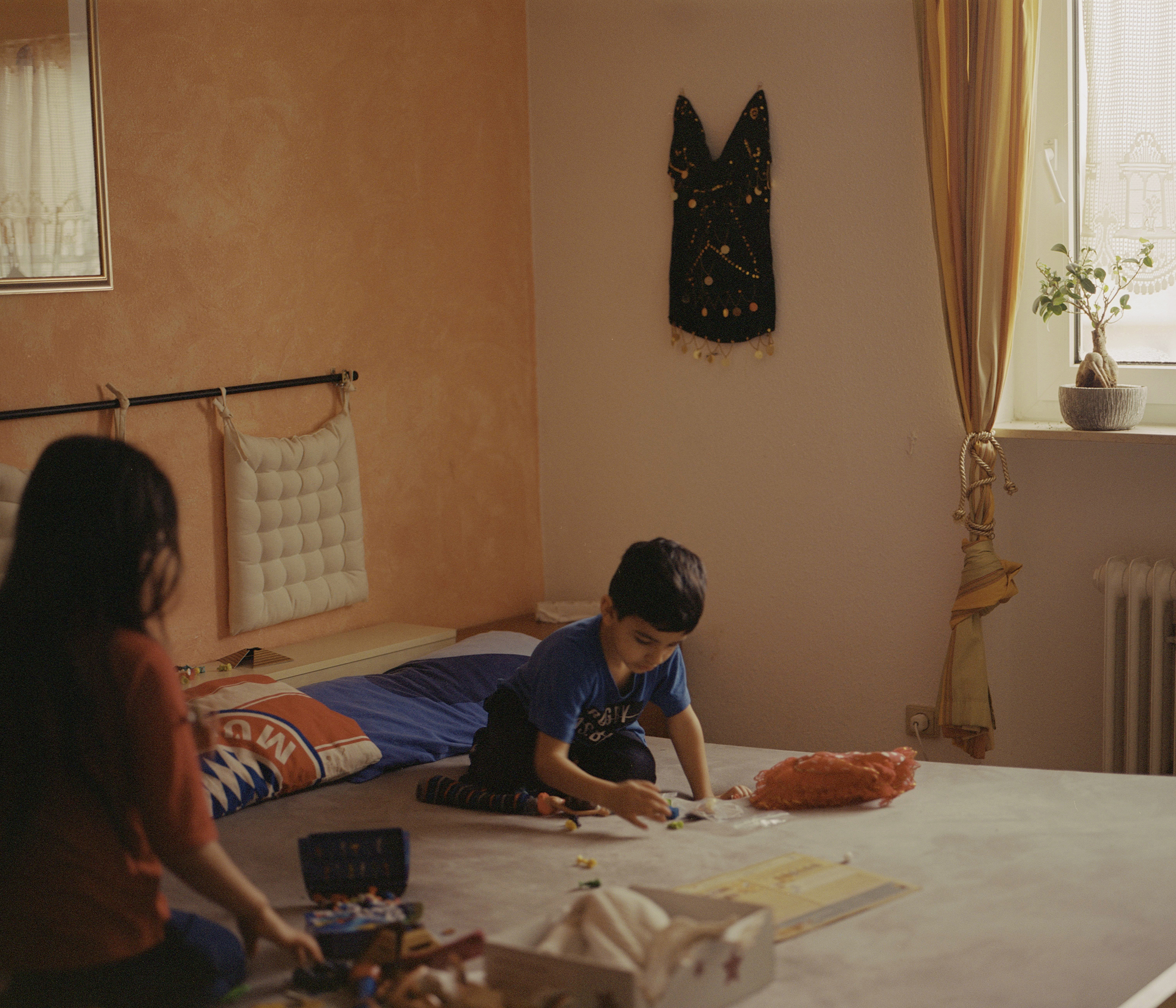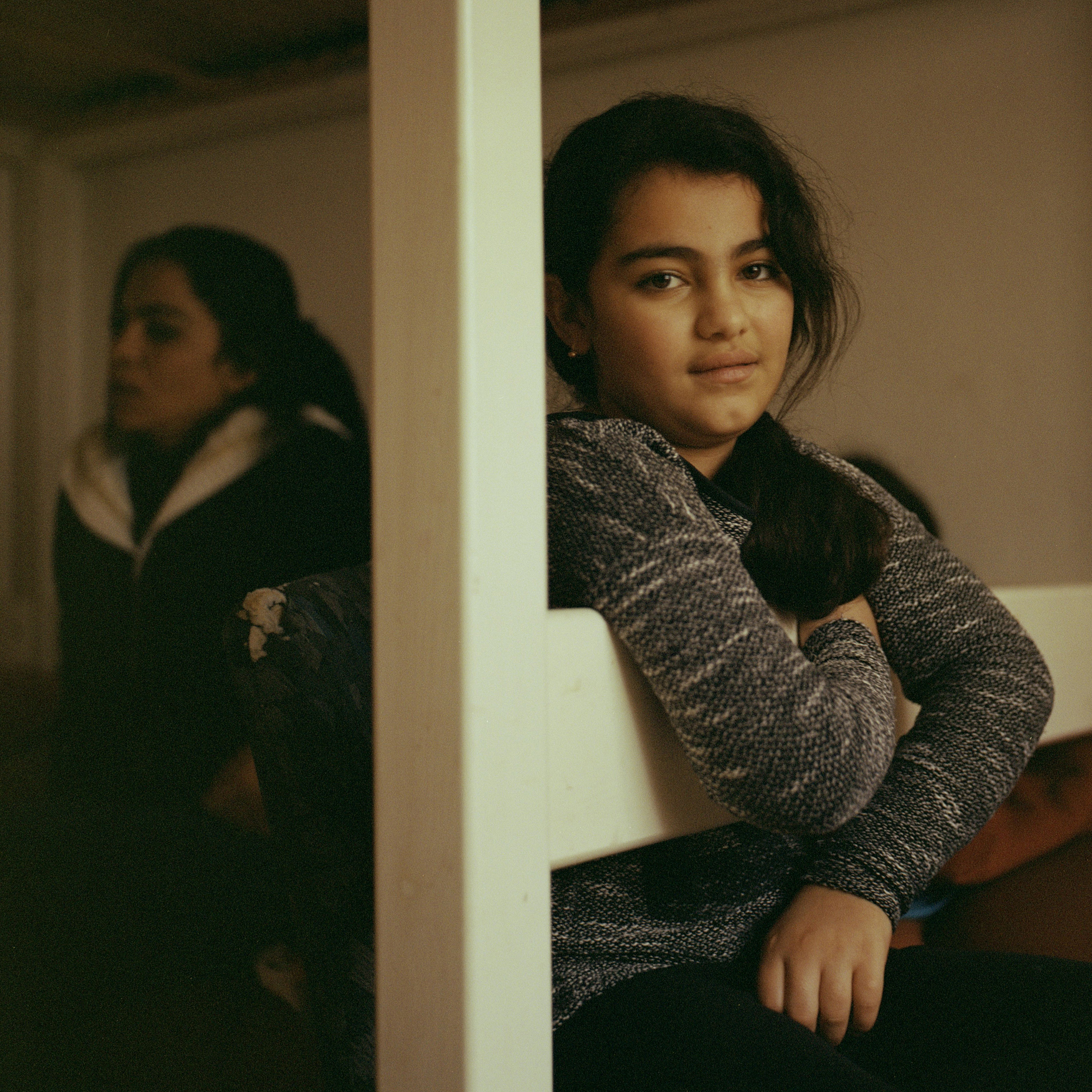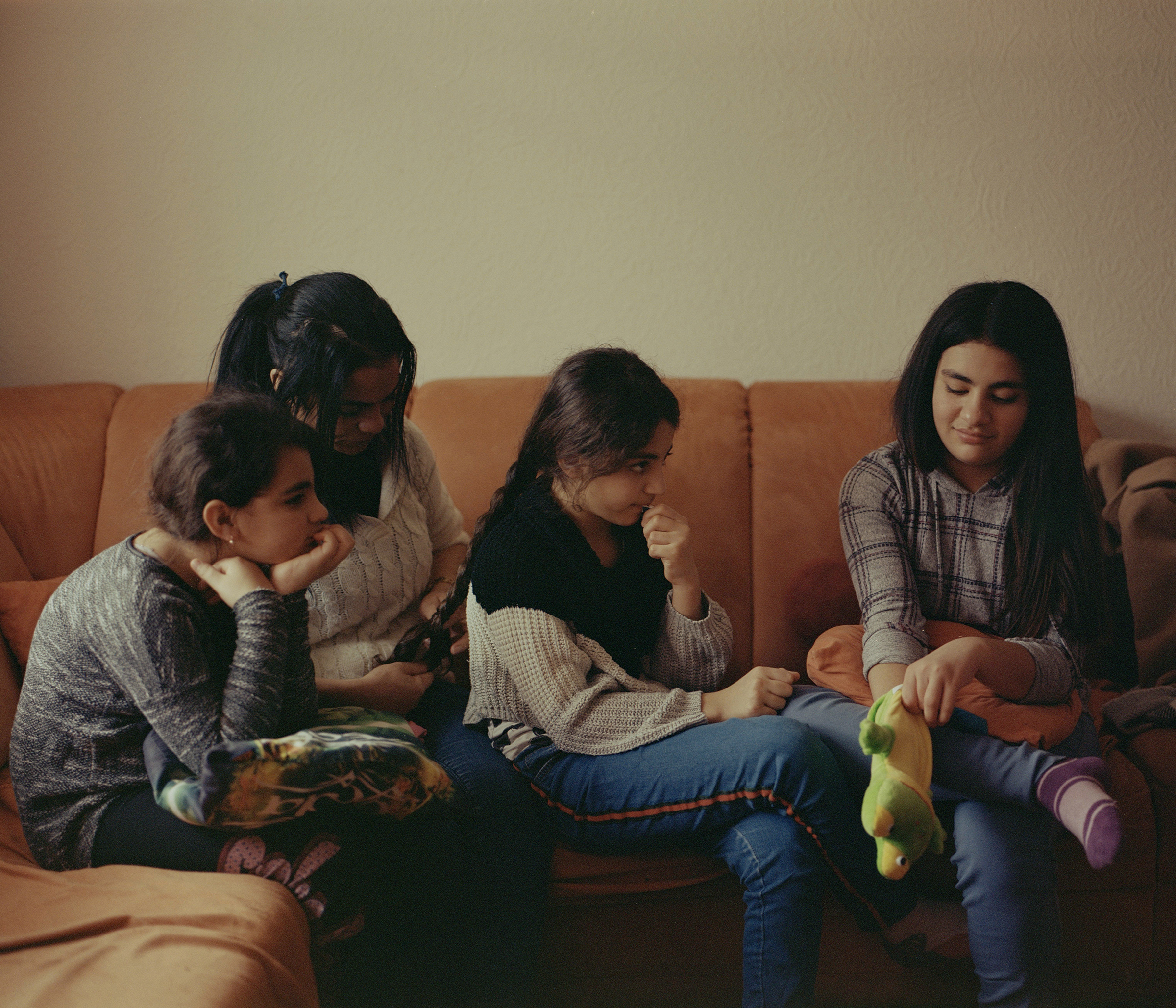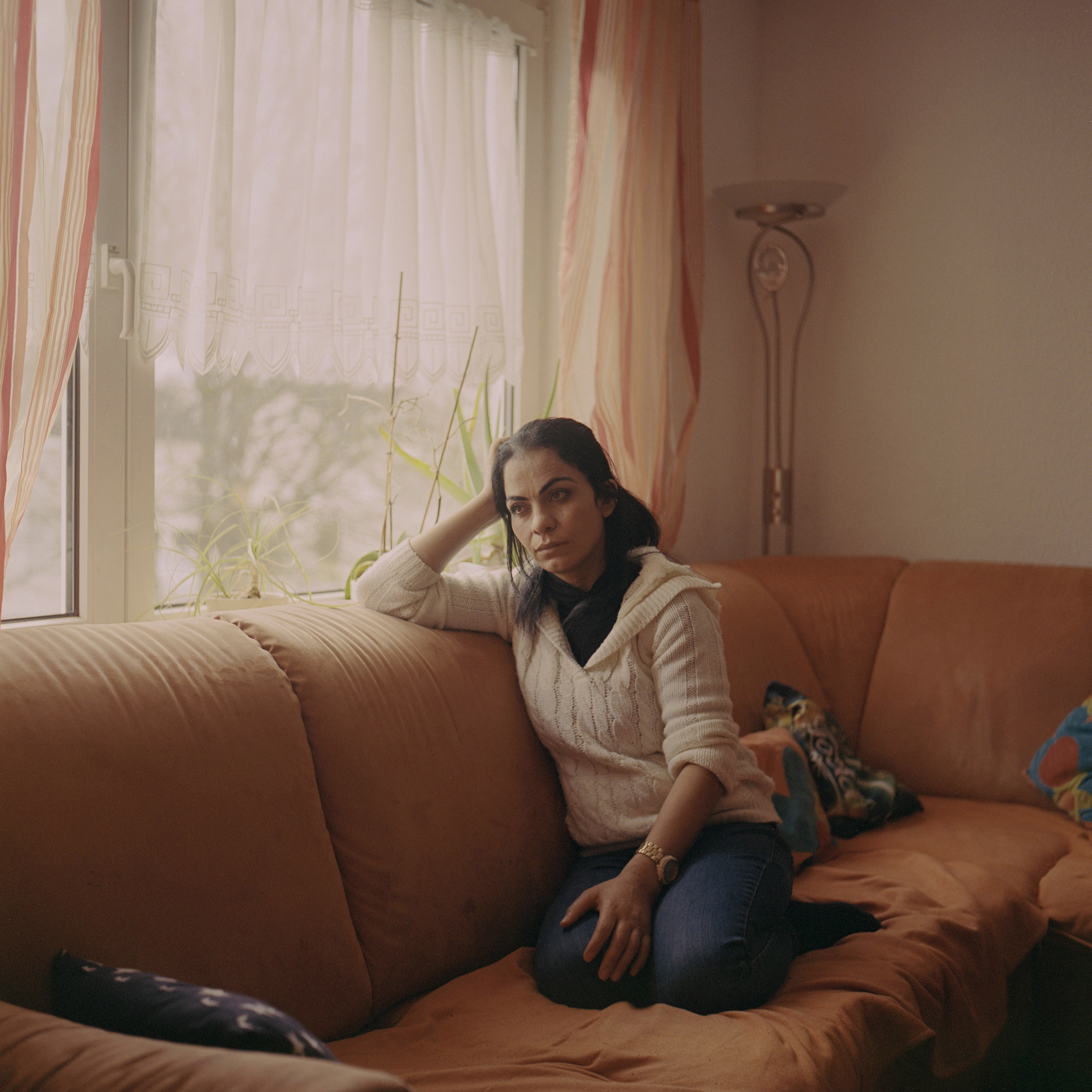When Hanan escaped from Islamic State captivity, there wasn’t much to come back to.
She and her five children had survived a year in a living nightmare. After her husband finally managed to arrange their rescue in the summer of 2015, they joined him in a dusty camp in Iraq where he lived in a tent. The Islamic State of Iraq and Syria (ISIS) still controlled the territory they called home, and they were unsure if they could ever go back. And Hanan was unsure if she could ever escape the darkness she felt inside.
So when, in the fall of 2015, Germany offered her the promise of safety and a chance to heal from her trauma, it wasn’t a difficult decision. Accepting a place in a groundbreaking program for women and children survivors of ISIS captivity did mean leaving her husband behind in the camp, but she was told he could join her after two years. So she and her children boarded the first flight of their lives, out of Iraq and away from their tight-knit community, in search of safety and treatment for what still haunted them.
Hanan, now 34, was one of 1,100 women and children brought to Germany in an unprecedented effort to aid those most affected by ISIS’s systematic campaign to kill and enslave the ancient Yazidi religious minority. (TIME is identifying Hanan by her first name only for her safety.) Launched by the German state of Baden Württemberg in October 2014, the program aimed to help survivors of captivity receive much-needed mental-health treatment and support. In Iraq, there had been a rash of suicides among the heavily-traumatized survivors, who had minimal access to mental-health care and faced an uncertain future. In Germany, far from the site of their suffering, state officials hoped the women and children could find healing and a fresh start.
But for Hanan, those promises remain unfulfilled. German officials never granted visas to any of the women’s husbands, leaving families, including Hanan’s, indefinitely torn apart. Like most of the women, she’s not undergoing promised trauma therapy. She often thinks about killing herself. The only thing stopping her, she says, is her children.


Not all the women are desperate. Some are thriving in Germany, and others have become global advocates for their community, like 2018 Nobel Prize winner Nadia Murad. She is the most prominent face of a program that was so ambitious and well-intentioned it inspired other countries, like Canada and France, to follow suit. But Hanan’s experience illustrates how parts of the program failed to live up to their full potential, and shows how difficult it is for refugees to gain access to mental health services, even in a program designed for just that. Michael Blume, the state official who led the program, sees it as a “great success” overall. But he is troubled by the state’s failure to bring the women’s husbands to Germany. “A great humanitarian program should not be sabotaged by bureaucracy,” he says. “But that’s what is taking place.”
Before she left Iraq, Hanan said she was given a piece of paper with information about what awaited her in Germany. “I wish I could find that paper now,” she says, “because the promises they gave us, they didn’t keep all of them.”
By the time ISIS swept across Sinjar, the area in northwest Iraq that is home to most of the world’s Yazidis, Hanan had already endured more than her share of hardship. Her parents were murdered in front of her when she was six. She and her two siblings went to live with their grandfather and his wife, where they were beaten, starved, and forced to work instead of going to school. Her baby sister died soon after.
In her early twenties, she escaped the torturous conditions at home by marrying Hadi. It was the first good fortune of her life, she says; they loved each other. Over the course of about seven years, they had four daughters and then a son, who was just a few months old in August 2014, when ISIS captured Sinjar and unleashed its systematic campaign to wipe out the Yazidis.
In conquered Yazidi towns, fighters executed the men and elderly women. Boys were sent off for indoctrination and forced military training. Women and girls were sold into slavery, traded among fighters like property and repeatedly raped. Hanan and her children were among more than 6,000 people kidnapped. Hadi, who was working as a laborer in a city beyond the reach of ISIS when their village was captured, was frantic when he learned his family was gone.
Within days, President Barack Obama launched U.S. airstrikes on ISIS militants, and U.S. forces delivered food and water to besieged Yazidis trapped on Sinjar mountain. In the following months, as Yazidi women and children started emerging from captivity—some escaped, while others were rescued by a secret network of activists—with tales of horror, Yazidis pleaded for more international action. Former captives were severely traumatized. Mental-health care in Iraq was limited. And because the Yazidi faith doesn’t accept converts or marriage outside the religion, the women raped and forcibly converted to Islam by ISIS members feared they were no longer welcome in the community.
In Germany, home to the largest Yazidi population outside of Iraq, officials in Baden Württemberg decided to act. In October 2014, state premier Winfried Kretschmann decided to issue 1,000 humanitarian visas and earmark €95 million ($107 million) for what became known as the Special Quota Project for Especially Vulnerable Women and Children from Northern Iraq. The state recruited 21 cities and towns across the southwestern state to host the refugees, agreeing to pay municipalities €42,000 ($50,000) per person for housing and other costs, while the state would cover the cost of their healthcare. Two other states agreed to take an additional 100 people.

Program officials interviewed survivors of ISIS captivity in Iraq, selecting those with medical or psychological disorders as a result of their captivity who could benefit from treatment in Germany. The project was not restricted to Yazidis, and a small number of Christians and Muslims also were chosen. That was when the officials told each woman that after two years, immediate family members like husbands could apply for a visa under German rules for family unification.
Read More: He Helped Iraq’s Most Famous Refugee Escape ISIS. Now He’s the One Who Needs Help
The program was groundbreaking. No German state had ever administered its own humanitarian admission program. And instead of waiting for asylum-seekers to make dangerous journeys across the Mediterranean, officials were seeking out the most vulnerable and bringing them to safety. The first plane arrived in March 2015. The last of the flights—including the one carrying Hanan—landed in January 2016.
Hanan, along with 111 others, was sent to a pleasant hilltop town of about 25,000 people at the edge of the Black Forest. (Officials asked that the town not be named to protect the survivors, whom they fear could be targeted by ISIS members.) For the first three years, she lived with about half of the group in an old hospital in the town center that had been converted into a communal residence.
Hanan and her five children occupied two rooms off a central corridor—one they used for sleeping, and the other, with a sink along one wall and a worn leather sofa along another, as a living room. They shared a bathroom and a kitchen with a large family next door.
“The neighbors are worse than Daesh,” she joked with a grimace, using a pejorative name for ISIS. It was May 2017, more than a year after her arrival. She sat on the floor to breastfeed her youngest child, Saber. At three, he was small for his age, but Hanan was small too. Her long dark hair was pulled back, and she wore a long blue skirt and a dark hoodie. Her next youngest, Sheelan, climbed into a wardrobe in the corner, peeking out from underneath thick black bangs. Haneya, her oldest at 10, and Hanadi and Berivan, eight and seven, were fighting with the neighbor’s children, their shrieks competing with the Kurdish music videos blaring from the television. Hanan yelled at them to stop.
Caring for her five children alone was wearing Hanan out. She was often sick, but found it difficult to go to the doctor because she didn’t have help with childcare. She complained about painful and unresolved gynecological issues from being repeatedly raped. She wanted to go back to the doctor, but she relied on social workers to make appointments for her and said they were blowing off her requests. And most days, she suffered debilitating headaches.

A trauma therapist came once a week to the shelter for a group session with the women, but Hanan usually wasn’t able to attend because of the children. And she didn’t want to talk about her experiences in front of the other women. When she slept, nightmares came. One night she dreamed she was back in captivity and an ISIS fighter was trying to take her oldest daughter, Haneya. Hanan woke herself and the children up with her screams. The older girls talked about their time in captivity often and sometimes had nightmares too. “They’re not like normal kids,” Hanan said. “When it’s nighttime, they ask me, ‘Mama, do you think Daesh is going to come to get us?’”
A year earlier, around six months after her arrival, that nightmare had become reality. She was out shopping for food when she spotted him. He had trimmed his hair and beard, and exchanged his tunic for a blue T-shirt. But it was him—the ISIS member who had been her captor for a month.
She stared, frozen in place. He saw her, too: His eyes widened in recognition and surprise. Panic shot through her and then her feet were moving, carrying her out of the store and around the corner. By the time she went to the police, he was gone. She said they treated her as if she had mistaken a random refugee for her former tormenter. But she knew what she saw. “How could I forget the face of the man who raped me?”
Germany was supposed to be a sanctuary. Now, inside the old hospital walls was the only place Hanan felt safe. She rarely ventured out, remembering threats from her captors that they would find her if she ran away.
She worried the man she’d spotted might come back to harm them. The only identifying information she could give police was his nom de guerre. And though police were stationed outside the shelter for some time after she made the report, Markus Burger, head of the department for refugees and resettlement in the town’s social office, said his office eventually received a report stating there was no direct threat. The police referred questions about the incident to the federal public prosecutor, and a spokesman for the prosecutor said the office was aware of the incident but could not comment further. At least one other woman in the program saw her own captor in Germany, and she later returned to Iraq because she no longer felt safe.
Hanan couldn’t understand why the police couldn’t find the man. She began to see threats anywhere she went. Muslim people speaking Arabic terrified her. Once at a park with her children, a bearded man on a bench called out to her. Though she had never seen him before, she was afraid. She gathered the children and rushed back to the shelter.

Yazidis are no strangers to trauma. The religious minority has endured centuries of persecution and attacks, from the Ottoman empire to Saddam Hussein to Al Qaeda. Jan Kizilhan, an expert in psychotraumatology and transcultural psychotherapy who was the program’s chief psychologist, was born to a Yazidi family in Turkey and immigrated to Germany as a child. Survivors of ISIS captivity are dealing not only with their own individual trauma from the violence and family separation they endured, he said, but also the historical trauma borne by their people, and the collective trauma from ISIS’s attempted genocide.
But after the women arrived in Germany as part of the program, trauma therapy wasn’t a top priority. At first, most of the refugees were focused on adjusting to life in Germany, said Kizilhan. They were also following the situation back home, where a multinational coalition was wrestling territory away from ISIS. With every victory, Yazidi families waited for news of their missing relatives, hoping they would not be among the bodies discovered in mass graves. Most had family members in camps, and others still in captivity. They weren’t ready to work through past trauma in therapy, because it was still part of their present.
There was another, more basic, obstacle to treatment: Most of the women were unfamiliar with the concept of psychotherapy. “To even help them understand why they would need this or how it would help, it takes time,” said Kizilhan. In many Middle Eastern cultures, including the Yazidi community, psychological trauma is often expressed somatically, he explained — many women complained of a burning liver, headaches, or stomachaches when the root was a psychological, rather than physiological, problem.
In 2017 and 2018, Tübingen University Hospital and the University of Freiburg, which were also involved in psychotherapeutic care for program participants, carried out surveys of 116 of the women in the program. Ninety-three percent of those surveyed fulfilled the diagnostic criteria for post-traumatic stress disorder during the first survey, and the number remained the same a year later. That makes the fact that just 40% of the women have received trauma therapy, years after their arrival, striking.


But Kizilhan insists the figure does not represent a failure. Some women simply don’t want therapy, he says, and it can’t be forced. He expects that an additional third of the women will be ready for therapy in the coming years. “And then we will be there to help them,” he says. “Each person is individual, different, and needs different timing.” The state decided to cover the cost of the womens’ healthcare indefinitely—initial plans were to foot the bill for three years—after it spent only €60 million ($71 million) of the allocated €95 million ($113 million) on the program.
Kizilhan acknowledges the challenges, including finding enough therapists and translators to work with the women. Kizilhan and Blume, who led the Special Quota project, say the program was an emergency intervention, and that a more long-term solution is building capacity for mental health care in Iraq. The state of Baden Württemberg has put resources toward that, too—donating €1.3 million ($1.5 million) to help establish the first master’s program for psychotherapy in Iraq, started by Kizilhan at the University of Duhok in 2017.
Kizilhan and Blume say the program in Germany has been successful despite the challenges. In the Tübingen University study, 91% of the women surveyed said they were satisfied to be in Germany, and 85% said they were satisfied with the program. When asked if they were satisfied with the psychosocial care, the number who said yes dropped to 72%. Hanan was among those who found it lacking.
Her struggle to access medical care and therapy were two of the ways she felt let down by the program. For her first three years in Germany, Hanan received minimal therapy, even though she wanted it. She rarely attended the group sessions, both because she found them unhelpful and because of the ongoing childcare issues. She said she was not offered individual sessions. Burger said when social workers saw some women were unhappy with group sessions, they arranged for individual therapy, and Hanan began talking with a therapist every few weeks. She said it helped a little, but she felt the same after each session.
***
On a Wednesday in July 2018, Hanan left German class early to shop for food. Before leaving home, she pulled on a fitted black blazer over her beige shirt and leggings. The clothes were new; she had recently cast aside the long, dark skirts and sweaters that she had worn ever since her escape for a more modern wardrobe. Friends had urged her to make the switch, teasing her that she dressed like she was still living under ISIS. Hanan walked to the store, passing traditional timber-frame buildings and window boxes overflowing with geraniums and petunias. She spotted a friend outside the supermarket and stopped to chat before buying chicken legs and vegetables. Managing the family’s budget alone—something she had never done in Iraq—was challenging. Sometimes she didn’t have enough money at the end of the month.
Two years on from encountering her former captor, the town was beginning to feel less threatening, though Hanan still didn’t like going out at night. She attended German language class four mornings a week. She’d never learned how to read or write as a child, so learning German was doubly hard, but she was making slow progress. She was also making a few German friends, and she’d found a way to decipher their text messages even though she couldn’t read. When she received a message, she’d paste it into the Google Translate app and press the audio button. A robotic voice would read it aloud and she’d reply via voice note.
Back at home, she put a pot of rice on the stove and began browning the chicken, preoccupied by the logistics of her upcoming trip to Iraq to visit her husband, Hadi. She’d learned through her social worker that her stipend would be paused while she was away, and Hanan wasn’t sure how she would make it through the month without the money.
It would be the second time she had to travel to see Hadi. (The women were admitted as humanitarian refugees, rather than asylum seekers, which spared them the process of applying for asylum and meant they were allowed to return to visit family in Iraq, unlike asylum holders.) Saber, now four, had spent most of his life separated from his father, and didn’t recognize him. The girls no longer even missed him. He was becoming a faraway memory.
Two and a half years had now gone by since she left Iraq, well past the two years after which Hadi had been promised he could apply for a visa. Hanan’s social worker helped her file papers related to his visa application. But whenever Hanan asked what was happening, she was given the same answer: Not yet.
What she didn’t know was that Germany’s position toward refugees had shifted. The welcoming stance the country adopted when more than a million people poured into the country seeking asylum in 2015 had hardened amid a backlash fueled by far-right anti-immigration parties. When he interviewed the women in 2015, and told them their husbands could apply for a visa after two years, Kizilhan was in line with the rules at the time. But now laws governing refugees and family unification visas were tightened. German courts even began ruling against Yazidis who requested asylum, saying it was safe for them to go back to Iraq.
To date, no husbands of women in the Special Quota Project have received visas. It’s hard to know how many are waiting: Kizilhan says he has identified 18. According to the study, 28 percent of the women surveyed had husbands in Iraq.
Read More: Syrian Women Are Embracing Their New Lives in Germany. But At What Cost?
A spokesman for the Baden Württemberg Ministry of Interior, Digitalization and Migration said that “special rules” apply to family reunifications for those granted humanitarian admission, and may only be allowed “for reasons of human rights, on humanitarian grounds or to protect political interests.” The special rules “must be considered on a case by case basis,” he said, and added the federal authorities are responsible for issuing visas, not the state.
Kizilhan said the ministry could intervene to make sure the family members are issued visas. But the political will behind the creation of the Special Quota Project has evaporated. In January, Kizilhan said he had recently met with state interior ministry officials to ask that they find a way to bring the husbands to Germany, but that they told him the change in federal law made it difficult to do so. “This is ridiculous,” Kizilhan says. “If you can take 1,100 with the special quota, you can take 18 people in one day.”
On trips back to Iraq, Kizilhan said he’s been confronted by husbands demanding answers, and is distressed that the state has not followed through. He notes that bringing the women’s immediate family to Germany would improve their psychological health—the goal of the program—by helping to reduce post-traumatic stress symptoms and easing their integration into society. Hanan often spoke of waiting for Hadi’s arrival to move into an apartment on her own. She was fearful of handling all the responsibilities of living in a new country without him. And she desperately needed help caring for the children, help she thought would be provided in the program. They’d spent a year separated from Hadi in captivity. Now, they were once again separated, once again waiting for their family to be reunited.

After Hanan’s visit to Iraq, months went by with no news about Hadi’s visa. They both began to despair that it would ever materialize, their frustration compounded by a dearth of information about the delay.
In the spring of 2019, after waiting three years, Hadi decided he could wait no longer. He borrowed money and set out for Germany along irregular migration routes. It took him eight months—he was detained in Greece on the way—but eventually he made it to Hanan. Their reunion, though, was far from perfect. After his arrival in Germany, the once-happy couple separated. Hanan would not discuss the details of their estrangement except to say that it took root because of their physical separation and left her distraught. He is now in a relationship with another woman and Hanan said he is not in touch with his children. His future in Germany is uncertain, too—it is unclear whether he will be permitted to stay.
Last summer Hanan moved into a light-filled two-bedroom furnished flat rented for her by the municipality in a quiet residential neighborhood. It’s decorated brightly in orange—a peach wall, tangerine dining chairs, an ochre shag carpet, and a sofa the color of carrots. While there’s a bunk bed in the kids’ room, they usually end up sleeping in Hanan’s king-size bed every night, a tangle of arms and legs. She was finally able to see a doctor to resolve her lingering gynecological health problem, although the daily headaches are still there. She’s no longer afraid of going out at night.
On a Sunday morning in January, she awoke late, groggy from hosting friends the night before. Saber, now six, and Sheelan, seven, plopped on the sofa to watch Tom and Jerry on the television as Hanan made bread in the kitchen. Squeezing small lumps off the dough, she quickly slapped each one from hand to hand, stretching it into a thin disc. In Iraq, she would have baked the loaves in an outdoor clay oven. Here, she used a small metal box oven, heated with an electric coil, placed on the countertop. She placed each loaf on top to let it brown, then baked it inside the oven before stacking the finished loaves on the windowsill.
When she was done, the children gathered at the table, scooping up fried eggs, yogurt, tahini, and cheese with the fresh bread. They chattered together in German; they rarely spoke Kurdish with one another anymore. Saber, impish and sensitive, speaks German with a near flawless accent. After breakfast, the three older girls clear the table, wash the dishes, and sweep the floor unbidden. Hanadi, now 11, and Berivan, now 10, both with round cheeks like their mother, are learning how to swim at school. Haneya, now 13, reads and translates the mail and types messages in German for her mother.
“Sometimes I look at my kids and think ‘OK, I’m all right.’ But I just feel bad,” Hanan said, lowering herself onto the sofa. “It’s a bad feeling inside of me, I don’t know how to explain it. Sometimes I want to hit myself, because of this bad feeling inside, and I don’t know how to deal with it. Many times I thought about killing myself, but then I remember my kids, that they need me.”
The situation with Hadi has her so upset she doesn’t think about ISIS anymore, Hanan said, adding that she doesn’t know what to do or where to turn. She’s spent hours crying with a Yazidi friend, another survivor, who lives nearby. That’s the closest she gets to therapy now.
After Hanan moved into the apartment, her therapy sessions ended. A few months later, social workers took her to an appointment at a new therapist’s office, but she hadn’t gone back. She said the appointment time of 7 p.m. was impossible as there was no one to watch the children at home. But she knows she needs help. “It’s too much for me,” she said. “I can’t hold all these problems alone.”
Read More: Is Germany Failing Female Refugees?
Burger, of the town’s department for refugees and resettlement, said that as more of the women moved into private apartments last year—all but 10 now live on their own—it became harder to arrange therapy sessions. Some therapists have waiting lists, and there is always the problem of timing, he said. “It’s difficult finding a time when the trauma therapist and the translator both are available, and also when someone can take care for the children, and when the German classes aren’t at the same time. But we are working on it.” He could not give a number for how many of the women in the town were undergoing therapy, saying it was constantly changing, but said therapy was available to all who wanted it. “We can only offer it,” he said. “In the end it is the decision of the women if they want to take part in the programs, and we don’t want to and can’t force anyone to take part.”
Hanan knows it was right to come to Germany. She’s better off than she would be in Iraq, where despite the territorial defeat of ISIS, most Yazidis are still displaced, and their future is uncertain. She feels safe now in Germany, and she can see bright futures for her children here.
But she can’t muster any of that hope for herself, not after losing Hadi. The darkness she had hoped to escape never went away. “Maybe I’m going to go crazy, or I’m going to kill myself. Maybe I won’t find a solution for myself except to die,” she said. “Now I’m 34, and I didn’t see any hope in my entire life. And for the future also, I don’t have any hope. Only God knows.”
—With reporting by Navin Haji Semo and Madeline Roache
Reporting for this story was supported by a grant from the International Women’s Media Foundation Reporting Grants for Women’s Stories.
More Must-Reads from TIME
- Introducing the 2024 TIME100 Next
- The Reinvention of J.D. Vance
- How to Survive Election Season Without Losing Your Mind
- Welcome to the Golden Age of Scams
- Did the Pandemic Break Our Brains?
- The Many Lives of Jack Antonoff
- 33 True Crime Documentaries That Shaped the Genre
- Why Gut Health Issues Are More Common in Women
Contact us at letters@time.com
